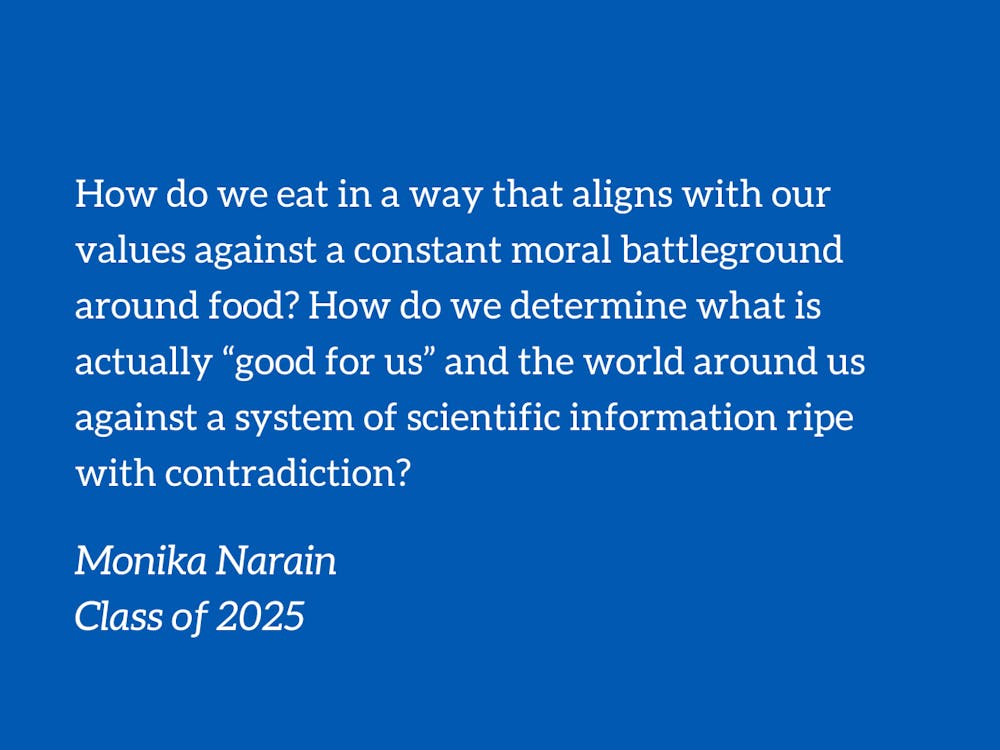"Eggs are good for you," and "eggs are bad for you." "Wine is good for you," and "wine is bad for you." "Coffee is a superfood" but also "damaging to your health." "You should never eat saturated fat," but "it’s really not that bad according to science."
It seems that nutritional studies are constantly contradicting one another. One moment we hear that a certain type of food is good then bad, healthy then unhealthy. This trend has occurred both with foods and entire food groups — like the low-fat craze in America in the 80s, in which few faulty studies from the 40s correlating low-fat diets with lower heart disease risk morphed into a dietary ideology promoted by health media, food industries and the American government. However, this drastic reduction in fat consumption actually resulted in higher cases of diabetes — not to mention all the nutritional deficiencies that come from not eating an entire food group!
Accurate nutritional information is imperative for influencing our nation’s food policies, marketing and education. After all, nutrition science is the reason many of us were forced to change our notion of a healthy diet from a pyramid to a plate (because how did the government not know that nobody eats on a pyramid?!). So this rampant contradiction is concerning and frustrating to people who are looking to better care for themselves through food.
One of the reasons for nutritional uncertainty stems from the flaws in nutritional study design. For starters, nutrition studies are often not well-funded, so low sample sizes can lead to results that aren’t generalizable to a wider public. Most studies that track dietary behaviors rely on self-reporting; for example, one would have to report everything they ate in a day with the exact quantity and exact time they ate it. The issue is that most people don’t remember what they eat long-term (I don’t even remember what I had this morning), and it’s impractical to measure out all your meals with scientific precision. Additionally, in the gold standard of dietary research — the randomized control trial — you would separate your sample into different dietary regimes for long periods of time. However, people are notoriously bad at sticking to diets (which is why 95% of diets fail). Finally, nutritional studies are never conducted in a vacuum (if so, that would be pretty uncomfortable for the participants), and these cannot control for major confounding variables for dietary behavior such as activity level, access to food, religion and income.
However, a more sinister issue comes from nutritional reporting and publication bias. Most people get their science from media as opposed to academia, so journalistic headlines must rely on bold rhetoric to capture viewers’ attention. This often means that these headlines are polarizing, often at the expense of factual reporting. After all, a headline like, "Coconut oil contains several nutrients, but can also cause adverse effects in high consumption," is a lot less interesting than, "Coconut oil has never been healthy" (to which my entire South Indian family collectively punches a wall).
I think at the core of this issue is the idea that food needs to be moralized, that we need to have a definitive stance on whether a food is "good" or "bad," if we should eat or should never eat it. But what if food didn’t have such a moral value, and instead was just … you know, food? What if every food has pros and cons and "healthy" looks different for everybody and everybody? What if an apple, for example, can be viewed with the same moral value as chocolate cake, bacon or soup, and the foods you consume have no connection to your moral value as a person?
This neutral philosophy towards food is a fundamental tenet to intuitive eating and eating disorder care, yet seems radical in contrast with our modern viewing of food as a dogmatic ideology. For the millions of people who struggle with disordered eating and eating disorders, it’s no wonder that it’s so difficult to un-internalize the guilt-focused mentality that underlies behaviors like restriction and binge eating, because that moralizing rhetoric is all around us — on magazine covers, at dinner table conversations, even on the names of bakeries like "Sinful Sweets" … because the Devil is watching you eat that chocolate-covered strawberry.
Moreover, with the increasing impacts of climate change and the wide availability of information on forced labor and animal welfare, it definitely isn’t fair to view food with neutrality to the point of complete detachment. Eating is never done in a vacuum — again, that would be really claustrophobic! Many of our food choices likely have some form of unintended harm just given the nature of our nation’s food system, and that is an unsettling reality to process. Our food choices do have political power, but our political situations do inevitably impact our food choices — especially as college students relying on Monopoly money (otherwise known as food points) to get through the day.
How do we eat in a way that aligns with our values against a constant moral battleground around food? How do we determine what is actually "good for us" and the world around us against a system of scientific information ripe with contradiction? What will have to happen to the foundations of nutritional science and nutritional journalism, or the very definitions of "healthy" and "unhealthy" itself?
Just as figuring out what you like to eat is an ongoing process, so is nutritional science, and we’re not always going to get it right. For now, when consuming nutrition-related media, it’s important to not hold every finding as a fixed truth, but rather one observation for a certain group of people, an observation that should be taken with a grain of salt (kind of like French fries).
Monika Narain is a Trinity junior. Their column typically runs on alternating Thursdays.
Get The Chronicle straight to your inbox
Signup for our weekly newsletter. Cancel at any time.

